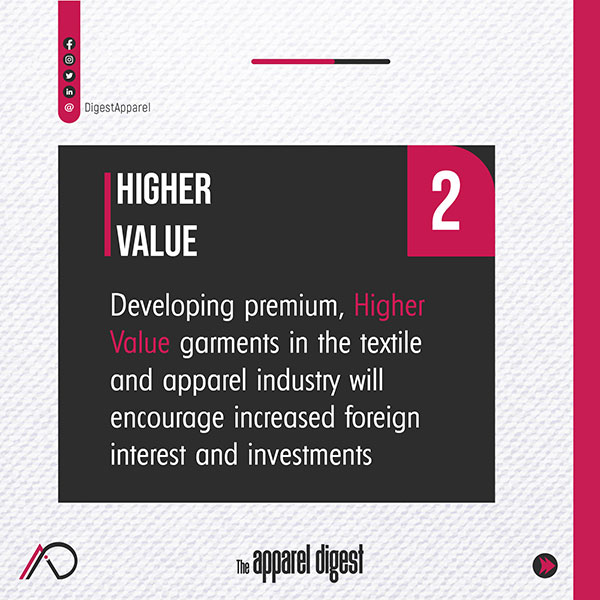I Hossain
If you look into Bangladesh’s apparel sector exports performance in recent times even amid the ongoing Covid-19 pandemic it is quite satisfactory.
But the disappointing issue is the sectors’ earnings are highly dependent on five basic products, which is a great concern for the sustainability of the growth and to increase its market share in the global markets.
According to Export Promotion Bureau (EPB) data in the fiscal year 2020-21 Bangladesh earned $31.45 billion exporting readymade garment products.
Of the total exports earning from the clothing products, 82% of total apparel exports earnings came from five products: trousers, T-shirt, Sweater, shirts and blouse and underwear contributes.
Of which, 33.95% or $10.68 billion came from trouser, the highest, followed by T-shirt 23.01% or $7.23 billion , Sweater 12.88% or $4 billion, shirts and blouse 6.51% or $2 billion and 5.68% or $1.78 billion from underwear.
On the other hand, other products contributed $5.64 billion or 18% came from other products, which indicated the dominance of five basic products.
Meanwhile, the country’s primary textile sector is also capable of supplying fabrics for low and mid-range products. There is a huge gap in the segment of value added products.
Though local fabrics manufacturers are able to meet knitwear fabrics almost 95% but the woven sector is still about 70% dependent on imports mostly from china.
The higher dependency on imports increases lead time, which was mostly felt during the pandemic as the supply chain disruption hit the production badly.
In the given context, what is the solution? How Bangladesh could make its growth sustainable and become self-reliant in meeting the demands of fabrics and yarns?
In addition, is Bangladesh ready to take it to a new height by producing high end products?
Answers to these questions are simple. We need more and more investment both from and abroad to increase our capacity.
Local investors are making investment in the textile sector to improve the capacity but it is not enough in comparison to the demands.
As per the data of the Bangladesh Textile Mills Association (BTMA) data, a total 26 primary textile manufacturers invested Tk 5,970 crore in 2021.
On the other hand, about 100 new apparel manufacturers entered in the business in 2021, who are the members of Bangladesh Garment Manufacturers and Exporters Association (BGMEA) and Bangladesh Knitwear Manufacturers and Exporters Association (BKMEA).
Another question here remained unanswered. It is where Foreign Direct Investment (FDI) is needed?
Analyzing the exports data it is found most Bangladeshi export oriented apparel makers are doing well in basic and medium-end products.
In moving towards high valued products manufacturing, Bangladesh needs adoption of high technology. To run this technology, there is no alternative to technical know-how and experience sharing.
Here, joint venture investment and FDI in these areas will be very crucial for Bangladesh.
But the foreign investment in textile and weaving is very small in size.
According to Bangladesh Bank (BB) data, Bangladesh received $377 million in the fiscal year 2020-21, while during January-June period of 2021 it stood at $207 million.
In attracting Foreign Direct Investment in the sector first the government policy should be accommodative, favorable.
In addition, utility services for the investors should be accessible without any hassles.
In the export oriented apparel sector, overseas investment in basic product manufacturing is mostly discouraged in basic and medium segments as local investment is enough to run such factories.
Despite having huge opportunities in exporting high valued products such as suits, Bangladesh exported $500worth products. There are about 13 export-oriented suit-making factories in the country.
In moving towards high valued products like suits, blazers, fancy items, there is no alternative to joint ventures with manufacturers from countries like China, Japan, Vietnam, and Korea.
If we can join hands with these countries this will not only bring investment but also it will help to learn technical know-how and share experience.
In the present situation, FDI and joint ventures can play an important role in technology transfer and share experience to produce high -end products and increase production capacity in the RMG industry.
On top of that FDI should come in backward linkage textile and high-end products of the readymade garment as it will help transfer foreign and latest technologies to embolden local industry.
FDI in these segments can be a boon for Bangladesh economy in moving towards the value added products..
Bangladesh is the best place to invest as it offers a congenial environment to invest and full repatriation of profits.
So, the apparel manufacturers have to be open in welcoming new foreign investment mostly in value added products as well as in the backward linkage industry to grow further.
Government should provide all out support to the investors and guarantee protection to the foreign investors with policy support.

